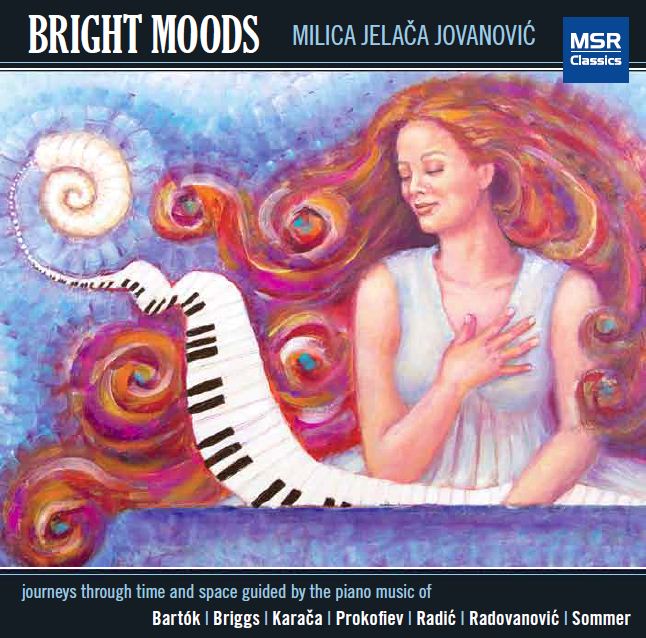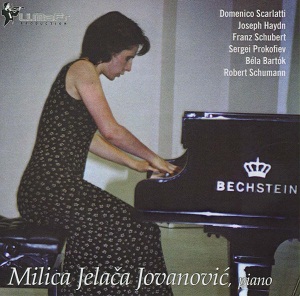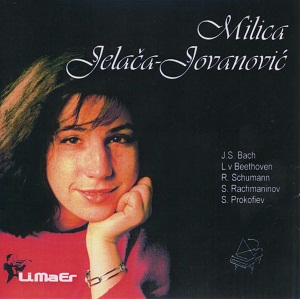![]()
Milica Jelača Jovanović - Recordings

|
BRIGHT MOODS | MILICA JELAČA JOVANOVIĆ
Journeys Through Time and Space Guided by the Piano Music of Bartók, Briggs, Karača, Prokofiev, Radić, Radovanović, Sommer Includes World Premiere Recordings | Released May 2012 Program
|
|
Cover Art: “The Coils of Time“ by Gordana Ćurgus www.ArtbyGordana.com | |
| Fanfare magazine July/Aug 2013. BRIGHT MOODS, Milica Jelača Jovanović (pn), MSR 81419 (61:58) Review by Peter J. Rabinowitz. | |
|---|---|
Colin Clarke was enthusiastic about this collection when he reviewed it in Fanfare 36:2, and for good reason. Or, more accurately, for two good reasons. First, the repertoire—five unfamiliar postwar works (including three first recordings) sandwiched between two early 20th-century staples—is simultaneously attractive and offbeat, an ideal program for a pianist trying to make a name for herself. Clarke gave informative descriptions of the newer works, so I won’t cover that ground in detail again. Suffice it to say that, while this is a disc made up almost entirely of miniatures (26 separate items taking just over an hour), even the shortest manage to assert their personalities with force and focus. I was particularly taken with slightly menacing brooding of the first of the Radić preludes (slightly reminiscent of Rachmaninoff, as Clarke mentioned—at least in its glowering, if not in its harmonic vocabulary), with the chipper neobaroque idiom of Radovanović’s C-Minor Prelude (with a sly nod to the Bach Toccata and Fugue in D Minor), with the ever-shifting harmonic terrain of the opening section of Roger Briggs’s Impromptu, and with the subtle disorientations in Lesley Sommer’s Five Pieces. But in fact, everything here is well worth savoring. Second, as is obvious from just the first minute or so of the Prokofiev Sarcasms, Milica Jelača Jovanović is a superb pianist of tremendous character. Clarke referred specifically to her “ability to change mood instantaneously”—and her quick reaction time was the first quality that struck me, too. A supremely responsive musician, she’s capable of rapid shifts of touch, ready to move from passages of tremendous vigor and rhythmic kick to moments of seductive suppleness, equally at home in passages of sunlit simplicity (say, the almost Mikrokosmos-like A-Major Prelude by Radovanović) and in the heaviest proclamations (note the way she presents the dark tread in the last of the Radić preludes). Her fingers are strong (listen to the feline volatility at the beginning of the third Sarcasm or the bite in the motoric Allegro con moto at the center of the Radić)—and she manages to toss off the most complex rhythmic superimpositions with startling clarity. She’s got a splendid sense of color, too, which allows her to make the most of the night-music in the first movement of the Sommer and the fourth of the Bartók. Good engineering—and excellent notes by Edward Rutschman who, like Briggs and Sommer, is a colleague of Jovanović’s in the music department of Western Washington University. Quite a department—and quite a CD. Warmly welcomed | |
| Fanfare magazine July/Aug 2013. BRIGHT MOODS, Milica Jelača Jovanović (pn), MSR 81419 (61:58) Review by Lynn René Bayley. | |
“Here’s a CD that grabs the listener’s attention from the first note and doesn’t really let go until the last. Milica Jelača Jovanovič is a Serbian pianist who comes from a family of musicians, began giving recitals at age eight, and studied at both the Tchaikovsky State Conservatory in Moscow and the University of Michigan. Judging by both her photos and the matter-of-fact bio in the CD booklet, she appears to be a rather modest, low-key artist, which is something I like. I also like her playing—quite a bit, in fact. She not only has the usual fine technique (what pianist today doesn’t?) and good styling, but also a sense of humor that is even rarer than her other good quality, a sense of drama. Several years ago, I reviewed a wonderful piano recital by Mayron Tsong (Centaur 2946) on which she played the Prokofiev Sarcasms, and was utterly blown away by her fiery interpretation. Jovanovič is also fiery in places, but to my ears she injects a bit more humor into the music, which is welcome indeed. At the other end of this recital she gives us Béla Bartók’s short cycle Out of Doors, and again finds several emotions, including the composer’s wry humor, that not many others do. Among other fine recordings of this latter work are those by three pianists I greatly admire, Joanna MacGregor (Warner Classics 672037), Zoltan Koczis (Hungaraton 32528) and György Sándor (Vox Box 3610), and it is to Jovanovič’s credit that she can hold her own in such august company. The CD insert claims that the pieces by Igor Karača, Roger Briggs and Lesley Sommer are world premiere recordings, and they probably are, but I could not find listings on Arkivmusic for any music—let alone the pieces recorded here—by Vladan Radovanović (b. 1932) or Dušan Radić (1929-2010). I am working on the assumption that there may be some Eastern European recordings of their music that are not currently available in the U.S., but to me (and probably to many of our readers) these are new names. Karača, a Bosnian pianist and composer of both classical and jazz music, gives us here an almost old-fashioned Nocturne in a minor, with a triadic left-hand accompaniment reminiscent of Beethoven’s “Moonlight” sonata. But the music doesn’t stay in one place for long: within its three minutes and 15 seconds, it goes through some polytonal effects. This piece was dedicated to Jovanovič. Radovanović’s Six Preludes also sound rather old-fashioned in structure and scope. The composer describes them as neoclassic, but I almost hear them as really Classical, in the style of Mozart or Haydn, although the second prelude sounds so much like J.S. Bach—especially in the beginning and end—that one is fooled until the rhythm and harmony break up into little shards and are then put back together. In the third prelude, Radovanović seems to be channeling Prokofiev, though the music is not at all an exact copy, and in the midst of it one hears a snippet of the Bach Toccata and Fugue in d minor. In the other preludes one hears snippets of music that could have been written by Schoenberg or Messiaen (particularly the fifth prelude), yet also what can be described as “zany Mozart.” The last prelude seems to combine elements of Bartók, Prokofiev and Mozart—a strange triumvirate indeed. Briggs’s Impromptu is an excellent piece, also balancing elements of older and newer musical styles and doing so in a more cohesive, elegiac manner than these particular pieces by Radovanović. This piece was also dedicated to Jovanovič, who gave the first performance. An agitated, contrapuntal middle section in b minor develops into a fugue, which then develops into what the composer describes as “a colorful, wave-like transition” which returns the listener to the original theme. Radić’s three preludes, following in the footsteps of the previous pieces and composers, also combines older compositional styles with modern techniques, except that his language is more Romantic and less Classical or Baroque in form. Moreover, the last two preludes are more reflective and ruminative in mood than most of the preceding works, showing up quite well Jovanovič’s ability to create a mood. To call Lesley Sommer’s Five Pieces on Poems of Robert Frost quirky and eclectic is an understatement, particularly the second one which schizophrenically alternates between frenetic contrapuntal lines, brusque and broken snippets of music, and a heavy-handed pounding out of the old Marlene Dietrich song, “Falling in Love Again.” (Personally, I’ve always hated Dietrich’s “singing,” particularly of this piece, but perhaps—considering the humor in the piece—Sommer was channeling Imogene Coca’s hilarious spoof of Dietrich on the old Your Show of Shows.) Bartók’s first piece from the Out of Doors suite, “With Drums and Pipes: Pesante,” has always rather reminded me of African rhythms, the “Barcarolle” of a Magyar Chopin, and the other pieces also seem to combine different ethnicities. Again, Jovanovič enters fully into the spirit of each piece, and when she reaches the finale (“The Chase – Presto”), one is swept away by the exhilaration of her playing. To be truthful, it’s difficult to judge what Jovanovič’s playing would be like in larger and/or more conventional piano works by listening to this recital, since the music here almost consistently borders on the odd and quirky, but I have to say that this is one outstanding disc and I, for one, will be listening to it again. But I’m not sure if it should have been titled Bright Moods. I think Quirky Moods would have said it better!” | |
| WHQR Public Radio, November 15, 2012.“Jovanović presents modernism on piano in "Bright Moods", review by Elise Seifert. | |
“Milica Jelača Jovanović’s newest recording is a wonderful album entitled “Bright Moods” that combines 20th century known composers with less known 21st century composers in a way that is exciting and dynamic. Jovanović is a Serbian born pianist, who studied in Michigan, is now a Professor of Piano and Keyboard Coordinator at Western Washington University. This album features compositions from fellow faculty members at Western Washington, including Roger Briggs and Lesley Sommer. Bright Moods begins with Sergei Prokofiev’s wonderfully ecstatic composition Sarcasms. Known for his Piano Concertos that changed ideas about composition, this piece shows just how different Prokofiev’s concepts were. A great piece to start off the album, the tone is definitely bright. Though Igor Karača’s Nocturne begins with tension chords slammed in odd rhythms, most of the rest of the piece is Chopin-inspired with beautiful melodies that float around the piano. Roger Briggs one movement Impromptu is a wonderful piece that falls perfectly between two 20th century pieces. There is a hint of a tonal center, and the piece seems to revolve around “unhurried contemplation”. Lesley Sommer, also a professor of composition at Western Washington University, present the premier recording of her Five Pieces on Poems by Robert Frost. Both energetic and soothing, the movements give the sense of some one relating poems to their own life in a distracted, stream of consciousness way. Jovanović’s playing is perfect for this new era of music, and without hesitation can switch from smooth, thoughtful melodies to the craziness of Prokofiev and others. The recording ends with Bartók’s Out of Doors, a piece that combines modernism with a hint of Hungarian ethnic music. The recording represents all the Jovanović could have hoped, a perspective on modern music that shows the many moods of 20th and 21st century composers.” | |
| Fanfare magazine, November/December 2012. BRIGHT MOODS, Milica Jelača Jovanović (pn), MSR 81419 (61:58), Review by Colin Clarke. | |
“Serbian pianist Milica Jelaca Jovanović studied at the Tchaikovsky State Conservatory (Moscow) and the University of Michigan. She currently teaches at Western Washington University. There is a nice phrase in Edward Rutschman’s excellent booklet notes describing Prokofiev’s penchant for lyricism and his taste for dissonance ”allowed the ghost of Rachmaninov-past to meet the spirit of Stravinsky-future”. Jovanović injects a nice bite into her Prokofiev. Her true sense of rhythm enables her to give convincing rubato in the second of the set, while the Allegro precipitato , the third movement, is nicely explosive. Here would be a good place to comment that the disc is very well recorded indeed, conveying the intensity of the pianist’s playing throughout. The sense of mystery in this music is likewise honored. The Nocturne by Bosnian composer Igor Karača, dedicated to the present pianist, is a clear homage to Chopin (the decorative filigree is unmistakably a personalization of Chopin’s fingerprint style). The incorporation of a more advanced harmonic framework than even late Chopin would allow allows the music to float outside of temporality. Jovanović has chosen six (out of 24) Preludes by the Belgrade-born composer Vladan Radovanović. The composer uses the term “polymusic” to describe his eclectic range of techniques (the E-Minor, the second we hear nods to the Baroque, for example). He could hardly wish for a better champion than Jovanović, whose ability to change mood instantaneously stands her in good stead here. The harmonies can seem elusive, elided, which adds to the mystery and fascination of this curious (in the positive sense) music. If the name Briggs seems out of place here (Roger Briggs, head of composition at Western Washington University), his Impromptu slots in remarkably well. It was composed directly at Jovanović’s request, and is a piece that unfurls at its own laidback pace before a savage interjection (realized most excitingly here) wakens it from its stupor. There is a Rachmaninov tolling bell aspect to the first of Dušan Radić’s Preludes, although as the booklet notes point out the overall feel is closer to Scriabin. This is impressive music, especially the ominous processional of the third Prelude. Lesley Sommer intriguingly uses the idea of night in Frost (a metaphor for death) as the basis for her two interludes which separate the pieces inspired by the poems “Acquainted with the night”, “Design” and “Come in”. This is a fascinating piece. Sommer uses musical quotation effectively (from the song Falling in love again by Friedrich Hollaender). The “Secret Interlude 2” begins with the most wonderful delicacy before shifting suddenly to a jazz version of Falling in love again. There is the impression of being taken by the hand on a fantastical journey. Finally, some Bartók, an exciting, eminently musical account of Out of Doors which might lack the final ounce of authenticity of, say, a Ránki (Teldec) or a Kocsis (Philips), but remains a creditable achievement. Overall, then, a most intriguing disc.” | |
|
| |
| Milica Jelača Jovanović plays Impromptu by Roger Briggs; WSMTA annual convention; June 21, 2012. | |
| Milica Jelača Jovanović plays Nocturne by Igor Karaca; WSMTA annual convention; June 21, 2012. | |
| Milica Jelača Jovanović plays Schumann's "ABEGG" variations; WSMTA annual convention; June 21, 2012. | |
| Milica Jelača Jovanović plays Prokofiev's Piano Concerto No. 3 in C major, Op. 26, with the Whatcom Symphony Orchestra conducted by Roger Briggs; February 24, 2008. The performance is followed by two encores: Rachmaninov's G-sharp minor Prelude and Schumann's No. 14 from the Davidsbündlertänze. | |
| Milica Jelača Jovanović plays Schumann's Piano Concerto Op. 54 in A minor (III. Allegro vivace) with the WWU Symphony Orchestra, Grant Donnellan conducting, March 6, 2006. | |
|
| |
| AUDIO LIVE RECORDINGS AVAILABLE ONLINE |
|---|
| Impromptu by Roger Briggs, Western Washington University Concert Hall, April 11, 2010; mp3 file available here. |
| Variations on the name “Abegg” Op. 1 by Robert Schumann, Dame Myra Hess Concert Series Recital, Chicago, Illinois, December 6, 2006; available at Classicalconnect.com. |
| Sarcasms Op. 17 by Sergei Prokofiev, Dame Myra Hess Concert Series Recital, Chicago, Illinois, December 6; available at Classicalconnect.com. |
|
|
 |
 |
|
MILICA JELAČA JOVANOVIĆ, piano
Live Recordings of Works by Domenico Scarlatti, Joseph Haydn, Franz Schubert, Sergei Prokofiev, Béla Bartók, Robert Schumann Double CD of Live Recordings Released 2003 LiMaEr Production, Belgrade, Serbia |
MILICA JELAČA JOVANOVIĆ
Studio Recordings of Piano Works by J.S. Bach, L. v. Beethoven, R. Schumann, S. Rachmaninov, S. Prokofiev CD Recorded at the Kolarac Hall, Belgrade, Serbia Released 2001 LiMaEr Production, Belgrade, Serbia |
|
| |